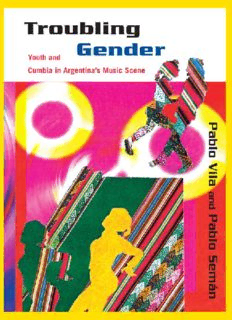
Troubling Gender: Youth and Cumbia in Argentina's Music Scene PDF
Preview Troubling Gender: Youth and Cumbia in Argentina's Music Scene
Troubling Gender Pablo Vila and Pablo Semán with contributions by Eloísa Martín and María Julia Carozzi Troubling Gender Youth and Cumbia in Argentina’s Music Scene temple university press philadelphia TEMPLE UNIVERSITY PRESS Philadelphia, Pennsylvania 19122 www.temple.edu/tempress Copyright © 2011 by Temple University All rights reserved Published 2011 Lyrics to “María Rosa,” “A Mover el Culo,” “El Bombón Asesino,” “Entregadora del Marrón,” “Se Te Ve la Tanga,” “La Sandra,” “La Transa,” “Se Hacen los Piolas,” “Pamela Chu,” “La Piba Lechera,” “Alta Gata,” and “El Bombazo”: Courtesy of SADAIC Latin Copyrights. Lyrics to “Que Peteás” and “Embarrada y Sucia”: All rights reserved. Library of Congress Cataloging-in-Publication Data Vila, Pablo, 1952– Troubling gender : youth and cumbia in Argentina’s music scene / Pablo Vila and Pablo Semán with contributions by Eloísa Martín and María Julia Carozzi. p. cm. Includes bibliographical references and index. ISBN 978-1-4399-0266-0 (cloth : alk. paper) — ISBN 978-1-4399-0267-7 (pbk. : alk. paper) — ISBN 978-1-4399-0268-4 (e-book) 1. Popular music—Argentina—History and criticism. 2. Cumbia (Music)— Argentina—History and criticism. 3. Popular music—Social aspects—Argentina. I. Semán, Pablo. II. Martín, Eloísa. III. Carozzi, María Julia. IV. Title. ML3487.A7V54 2011 306.4'84240982—dc22 2011006798 The paper used in this publication meets the requirements of the American National Standard for Information Sciences—Permanence of Paper for Printed Library Materials, ANSI Z39.48–1992 Printed in the United States of America 2 4 6 8 9 7 5 3 1 Contents Acknowledgments vii Introduction 1 1 T he History: Trajectory and Consolidation of the Cumbia in the Field of Argentine Music | Eloísa Martín (Translated by Pablo Vila) 23 2 The Lyrics 41 3 What Boys Have to Say 81 4 What Girls Have to Say 127 Conclusion 161 Postscript: Moving away from Name-Calling | María Julia Carozzi 173 Notes 179 References 203 Index 213 Acknowledgments Agradecer supone (con arrogancia) que se conoce el don recibido. A todos nuestros informantes, anfitriones y colaboradores, les ofrezco mis disculpas por no haberlos entendido por completo. To express appreciation assumes (arrogantly) that one knows the gift received. To all of our informers, hosts, and contributors, I offer my apologies for not hav- ing fully understood them. Pablo Semán Mexico City March 21, 2011 Numerous people helped to make this book possible. It goes without saying that I owe my first big thank-you to the young people who willingly shared with us their experiences in the cumbia scene. Without their enthusiastic partici- pation in this project, including the narratives about their lives, this endeavor would not have been possible. Several other people contributed in ways that were instrumental to the completion of this book. Special thanks go to Malvina Silba, not only for her outstanding fieldwork in the bailes and her superb interviews in the neighbor- hoods but also for the intense dialogue we have maintained over the years, which helped me to better understand the complex world that these young peo- ple inhabit and cumbia’s place in that world. This acknowledgment does not come close to showing the deep appreciation I have for Malvina’s contribution to the book. viii Acknowledgments The work of Carolina Spataro, José Garriga Zucal, and David Drutman was also vital to the completion of the research project. Their interviews and obser- vations formed the bases for many of our analyses, and our gratitude to them goes well beyond what I can express here. Many of my students at Temple University participated, in one way or an- other, in the manuscript development process. Ed Avery-Natale played a cen- tral role by reading and rereading the manuscript innumerable times to prepare it for publication and by helping compile the literature that we used to make sense of what we encountered in the field. Carl Gunlefinger, Candace Hines, Jennifer Kim, and especially Zakia Abukhdeir helped greatly in that regard as well. Audra Winn contributed immensely to some of the most challenging tes- timony translations, and Christina Stewart provided invaluable assistance in the creation of the book’s index. Peggy Westwell, in Buenos Aires, also came to our aid with some of the translations. Cecilia Serpa helped immeasurably by sharing her unpublished manuscripts on various aspects of cumbia villera. I received financial support from Temple University at several stages along the way, including a summer research grant and small grants from the College of Liberal Arts and the Department of Sociology. Two anonymous reviewers for Temple University Press offered important criticisms that greatly improved the final product. Janet Francendese and Joan Vidal at Temple University Press and Susan Deeks, who copyedited the manuscript, were a pleasure to work with. Janet helped me to navigate the usually difficult stage of presenting a book pro- posal. Joan was invaluable in the final editing stages. And Susan performed miracles with my particular version of the English language. Susana Groisman willingly modified her artwork as needed for the cover design. Hernán Beillard and Carlos Molinero helped me a lot with the difficult task of getting permis- sion to quote the lyrics of the songs. Finally, no academic work is accomplished without the help of friends and family. First, I must acknowledge my children, Juanchi, Paloma, and Malena, and my wife, Julia Chindemi Vila, for all their support. Many of my friends also encouraged me during the most difficult stages of the project. To Anto- nio and Alexandra Alfau; Enrique Figueroa; Eduardo Barrera; Raúl, Susana, and Marcela Chindemi; James Coulton; Sherri Grasmuck; John Landreau; Elizabeth Jelín; Carlos Molinero; Fernando Nachón; George Yúdice; Patricia Oliart; Ramón Pelinski; Héctor Ramírez; Susan and Brian Roberts; Leslie Sal- zinger; Fanny and Norberto Szmidt; Eddie Telles; and Luis Tulli, I owe many, many thanks. Pablo Vila Philadelphia March 22, 2011 Troubling Gender
Description: